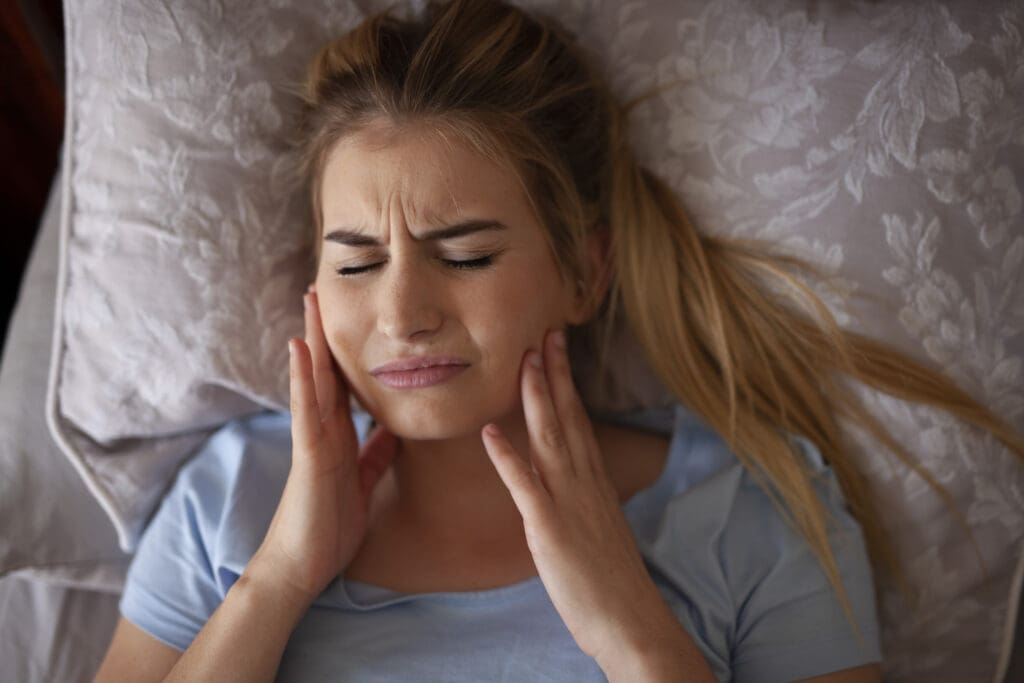Have you ever woken up with a sore jaw or a headache? Do your teeth feel sensitive or worn down? If so, you might have a condition called bruxism. Bruxism is the medical term for clenching or grinding your teeth. Many people grind their teeth while they sleep, and others do it during the day when they’re stressed or concentrating. At Hermitage Dental, we treat patients with bruxism in Edmonton, AB.
If you think you might be grinding your teeth, we’re here to help treat your dental concerns. Treating bruxism early can prevent serious damage to your teeth and jaw.

Why Does Bruxism Happen?
Teeth grinding can happen for several reasons. One common cause is stress or anxiety, which can lead to unconscious jaw clenching. Sleep problems, like sleep apnea, are also linked to nighttime grinding. If your bite is uneven, your jaw may work harder to chew.
Lifestyle habits like drinking too much caffeine or alcohol, smoking, or taking certain medications can also raise your risk. Understanding what causes bruxism is the first step in treating it and protecting your teeth and jaw from damage.
Signs You Clench and Grind Your Teeth
You might not know you’re grinding your teeth, especially if it happens while you sleep. But there are some signs to look out for that could point to bruxism:
Jaw Pain or Soreness
Do you wake up with a sore, tight, or tired feeling in your jaw? This could be a sign that you’ve been clenching or grinding your teeth while you sleep. The muscles around your jaw work hard when you grind, and that pressure can cause discomfort, especially in the morning.
Headaches
Frequent and dull headaches around your temples or forehead are another sign of bruxism. The tension from grinding can spread from your jaw to other parts of your head and neck. This pain can lead to headaches that don’t go away easily.
Tooth Sensitivity or Pain
Grinding wears down the enamel, the protective outer layer of your teeth. When this layer becomes thinner, your teeth may feel more sensitive to hot, cold, sweet, or acidic foods and drinks. You may also feel general tooth pain without knowing why.
Worn Down or Flattened Teeth
Bruxism can change the shape of your teeth. If your teeth look flat, chipped, or shorter than they used to, you could be grinding them down over time. This kind of damage can make your smile look different and may lead to more serious dental problems.
Clicking or Popping in the Jaw
Grinding can affect your temporomandibular joint (TMJ), which is the joint that connects your jaw to your skull. This can lead to jaw clicking and popping. Your jaw can also lock when you open or close your mouth. TMJ problems can also cause pain when you chew or speak.
Damage to Dental Work
If you have fillings, crowns, or other dental restorations, grinding can cause them to loosen, wear down, or even break. Damaged dental work can lead to pain, discomfort, or the need for expensive repairs.
Disturbed Sleep
Many people who grind their teeth at night don’t know they’re doing it. But someone else might notice it first. If your partner hears grinding or clenching sounds while you sleep, it’s worth talking to your dentist. You may also wake up often or feel tired in the morning due to poor sleep caused by grinding.
Visit our dental office if you have any of these symptoms. We can evaluate your jaw and how your bite comes together.
Bruxism Treatment in Edmonton, AB
At Hermitage Dental, we offer several treatments to help protect your teeth and reduce the symptoms of bruxism. Our dentists will begin with a full exam to check for signs of grinding, damage to your teeth, and problems with your jaw.
Some of the most common treatments for bruxism include:
Custom Night Guards
One of the most effective ways to protect your teeth from grinding at night is by wearing a custom-made night guard. A night guard is a soft or hard plastic device that fits over your upper or lower teeth while you sleep. It acts as a cushion and keeps your teeth from rubbing together.
Unlike store-bought mouthguards, custom night guards are made to fit your mouth perfectly. This makes them more comfortable and effective.
Stress Management
Since stress and anxiety are common triggers for bruxism, learning ways to relax can help. This might include breathing exercises, meditation, or talking to a counselor. Getting enough sleep and regular exercise can also reduce stress and improve your overall well-being.
Jaw Exercises and Physical Therapy
We can teach you simple jaw exercises to help relax your muscles and improve jaw movement. In some cases, working with a physical therapist can also help ease the tension in your jaw, neck, and shoulders.
Fixing Bite Problems
If your teeth are not aligned properly, we may recommend treatments to adjust your bite. This could include orthodontics, reshaping certain teeth, or replacing worn or missing teeth. Improving your bite can reduce the pressure on your jaw and prevent grinding.
Tips for Managing Bruxism at Home
Along with professional treatment, you can manage teeth grinding at home in multiple ways:
- Avoid chewing gum or biting on pens or your fingernails because habits can increase tension in your jaw.
- Use a warm compress on your jaw to relax tight muscles.
- Stretch your jaw gently by opening and closing your mouth slowly.
- Limit caffeine and alcohol, especially in the evening, as these can worsen nighttime grinding.
- Go to bed at the same time each night and create a calming bedtime routine.
Schedule a Consultation Today
Stop nighttime teeth grinding and morning headaches. Treat bruxism in our Edmonton, AB, dental office. You can request an appointment with our dentists online. Feel free to call Hermitage Dental at 587-806-4168. Let us know if you have questions about treatment and we’ll be happy to help.
